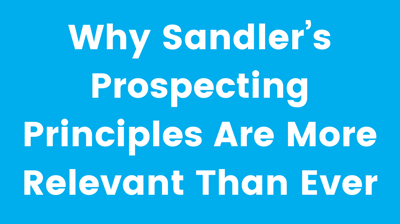5 Sandler Rules of Prospecting
Let's drill into some basic rules about prospecting behaviors that will empower you to create and implement a rock-solid prospecting plan. There are five in particular that we want to share with you. Follow these rules as you go forward, and you will be more likely to lift up all three corners of the Success Triangle.
Rule 1: Never manage your numbers, manage your behavior
What this means is that if you ever fall into the trap of imagining that you can manage your sales outcomes, you need to do a little bit of a reality check. The truth is, you can't control that. There's no magic wand you can wave that will make someone decide to buy. What you can control is what you do. How many conversations do you initiate? How many new contacts do you make? How many introductions do you ask for? Whether people decide to buy from you is interesting, of course, but the closing numbers are what's known as a lagging indicator. What you are interested in are the leading indicators, the behaviors that lead up to the point where people decide to buy from you. Those behaviors are entirely in your control.
Rule 2: You can't manage what you can't control
This is a corollary of Rule 1, of course, but it's worth examining on its own. If you can't control something, it follows logically that it doesn't make a whole lot of sense to invest major amounts of time, attention, energy, or worry trying to affect that thing you can't control. If you're spending all or even a significant chunk of your time working on things that you don't necessarily control (like whether someone likes you or feels good about you or decides to buy from you), that's a problem, and you need to change course.
Rule 3: You don't have to like prospecting - you just have to do it
If you spend time with the most successful people you know, one of the things you're going to notice is that a lot of times, they don't like things that they do, but they take action and execute on the behavior anyway. With apologies to Nike, they just do it. That's a decision. As a result of that decision to stop fixating on whether or not they like something that's within their control, something that they know they need to take action on, and instead to just do it, they are successful.
When you learn to act in spite of how you feel, you're going to be more successful and you're going to get more business done.
The most successful people act in spite of how they feel.
This isn't just a secret to massive success at prospecting - it's a secret to massive success in life. Just do it!
Rule 4: You can't fail at prospecting, you can only fail to prospect
When we talk to people about the behavior part of the Success Triangle, in most cases, we find that they rate themselves the lowest on the behavior corner—meaning they know what they should be doing, but they're not doing it. They're letting that attitude corner control the behavior corner. So we need to remind them that they really can't fail at prospecting. If you know what to do - and you do if you read 21st Century Prospecting -it's just a question of whether or not you're going to execute consistently and then track the results.
Rule 5: Every unsuccessful discussion yields compound interest
You may make a call on Monday and find that actually nothing comes from it until Wednesday, Thursday, Friday, Saturday, or the following week - or even later. One way that you can earn compound interest on calls that don't get you an appointment right away is that good outcomes can still happen down the line. Those wouldn't have happened without you taking action. But you know what else? You also learn important things from a call that doesn't produce an appointment or a meeting. You can look for areas where you can improve your tonality, your delivery, and your approach.
Forget about "always be closing." That's nonsense. You can, however, always be learning. When you do enough behaviors and generate enough activity, you will benefit from both kinds of compound interest. Rule 5 reminds you to keep at it.
This is a chapter from the book 21st Century Prospecting by John Rosso and Mark McGraw. If you'd like to learn more, you can purchase the book here.




.0000000000000.png)
